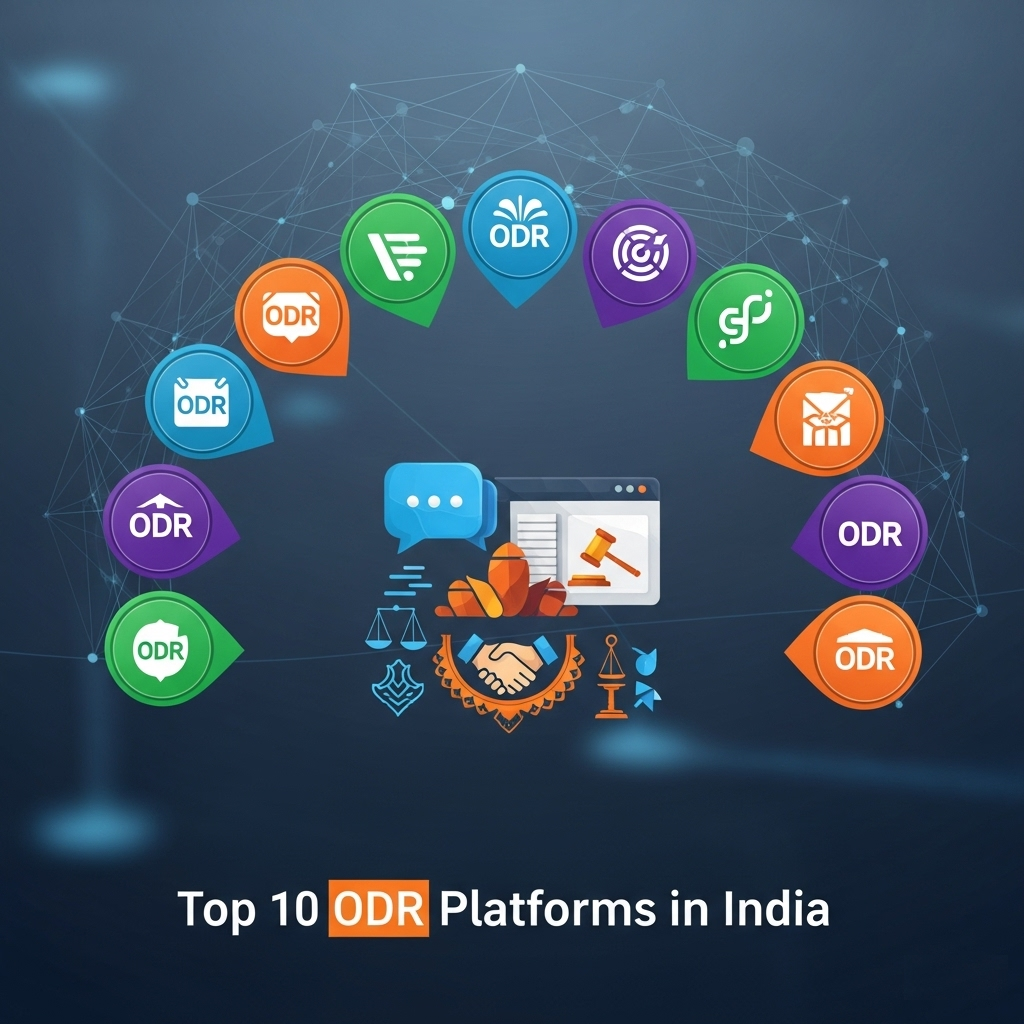
India is a country with over 1.4 billion people and is one of the fastest-growing digital economies. India faces an enormous litigation burden – there are millions of cases pending in courts, some for decades. Traditional litigation, while robust, is slow, costly, and often intimidating for ordinary citizens and businesses. These challenges lie at the heart of the movement towards Alternative Dispute Resolution (ADR). ADR includes processes that have no litigation like mediation, negotiation and arbitration that aim to resolve disputes faster and more amicably than conventional litigation.
The Rise of ODR Globally
ODR, or Online Dispute Resolution, is the digital evolution of ADR, leveraging technology to make justice accessible, affordable, and user-friendly. The seeds of ODR were sown in the mid-1990s, when the exponential growth of online commerce brought new types of disputes impossible to address with physical proceedings. eBay pioneered ODR for online buyer-seller conflicts, resolving over 60million disputes per year at its peak. Governments and international organizations soon recognized the utility: UNCITRAL, the European Union, British Columbia, and Hong Kong subsequently adopted ODR standards and platforms for cross-border commerce, family, and small claims disputes.
Milestones in India’s ODR Journey
India’s ODR story accelerated in the last decade:
• 2006: National Internet Exchange of India adopted the .IN Domain Name Dispute Resolution Policy (INDRP)—one of the first ODR mechanisms.
• 2011: Chennai hosted the International Forum on ODR, gathering global practitioners.
• 2017: Ministry of Law urged government agencies to embrace online arbitration.
• 2018: MSME Ministry launched the SAMADHAAN portal for business disputes.
• 2020-2023: Catalyzed by COVID-19, virtual Lok Adalats, e-courts, and digital legal clinics proliferated countrywide, making online mediation, arbitration, and negotiation a necessity, not just an option.
What Is ODR? How Does It Work?
ODR platforms use digital interfaces like portals, apps, chat and video conferencing to conduct the entire process of resolving disputes. They typically offer:
• Mediation: A trained neutral helps parties negotiate via digital channels until a mutual agreement is reached.
• Arbitration: The arbitrator hears evidence online, then delivers a binding decision enforceable by law.
• Negotiation: Secure software facilitates direct offers and counter-offers—often asynchronous, letting parties engage at their convenience.
• e-signing and digital evidence: Parties upload contracts, photos, voice notes, or business records for consideration.
• AI-enabled assistance: Some platforms use artificial intelligence for drafting, early resolution, or triage.
ODR demonstrates exceptional effectiveness across a wide range of dispute types, each benefiting from its efficiency, accessibility, and flexibility. Here’s how ODR applies to various sectors:
• Civil Disputes :
Includes matters such as breach of contract, property disagreements, and monetary claims. ODR streamlines resolution by enabling parties to present documents and arguments online, reducing delays associated with traditional courts.
• Commercial Disputes : Involves business conflicts between companies, suppliers, or service providers. Issues like unpaid invoices, partnership disagreements, and service failures are resolved efficiently via virtual hearings and digital evidence sharing.
• Consumer Disputes :
Covers complaints regarding defective products, unsatisfactory services, refund demands, and warranty issues. ODR platforms simplify the process for individuals to file claims and negotiate settlements remotely.
• Financial Disputes :
Encompasses banking, insurance, and loan related conflicts, such as recovery proceedings, unauthorized charges, and claim denials. ODR offers quick adjudication and online mediation, often with sector-specific panels.
• Small Business Disputes :
Pertains to vendor disagreements, payment delays, contract breaches, and partnership conflicts within SMEs and startups. ODR reduces costs and ensures fair resolutions that support business continuity.
• Labor and Employment Disputes :
Includes workplace grievances, wrongful termination claims, wage demands, and discrimination issues. The online format provides a confidential and prompt way to resolve sensitive employment matters.
• Family Matters :
Addresses issues such as divorce settlements, child custody, alimony, and succession disputes. ODR’s private and flexible environment helps parties negotiate and reach agreements in emotionally charged situations.
Legal Framework Supporting ODR in India
India’s regulatory groundwork for ODR is robust:
• Arbitration and Conciliation Act, 1996: The Arbitration and Conciliation Act, 1996, provides the legal framework for arbitration and conciliation in India, aligning with international standards to promote efficient dispute resolution. It governs the arbitration process, limits court intervention, and includes provisions for voluntary conciliation to facilitate amicable settlements, making it a key law for alternative dispute resolution.
• Section 89 of Code of Civil Procedure (CPC), 1908: Section 89 of the Code of Civil Procedure (CPC), 1908, supports Online Dispute Resolution (ODR) in India by encouraging courts to refer disputes to alternative resolution methods like arbitration, conciliation, mediation, or Lok Adalats when a settlement is possible. This provision promotes faster, amicable dispute resolution outside traditional court trials, thereby reducing case backlog and enhancing access to justice through ODR platforms.
• Information Technology Act, 2000 and Indian Evidence Act, 1872: The Information Technology Act, 2000, provides legal recognition for electronic records, digital signatures, and electronic contracts, enabling secure and valid online transactions in India. Coupled with the Indian Evidence Act, 1872, it ensures that electronic evidence and digital communications are admissible and valid in courts, supporting the legal foundation for Online Dispute Resolution (ODR).
• Supreme Court and High Courts: The Supreme Court and various High Courts in India have actively encouraged the adoption of Online Dispute Resolution (ODR) to reduce the burden of pending cases and improve access to justice. They have promoted initiatives like virtual Lok Adalats, court-annexed mediation, and e-filing of disputes, especially in commercial divisions, recognizing ODR as a cost-effective and efficient alternative to traditional litigation.
NITI Aayog’s ODR Policy: A Game-Changer
India’s top policy think tank, NITI Aayog, spearheaded national reforms in 2023. Their “Designing the Future of Dispute Resolution” policy paper outlined:
• The urgency of ODR adoption to address backlogs and promote fast justice.
• Recommendations for digital literacy, regulatory sandboxes, tech upgrades, and partnerships with judiciary and private ODR platforms.
• Endorsement by RBI, SEBI, the Ministry of Law, and other stakeholders for efficient dispute resolution in banking, securities, and commercial contracts.
• Vision for inclusive justice—leveraging ODR to reach marginalized populations, SMEs, and the digitally underserved.
Today, ODR is recognized at the highest levels of government and judiciary, with major banks, corporates, startups, and courts actively adopting platforms for pre-litigation, commercial, consumer, and social justice disputes.
Top ODR Platforms in India
1. CADRE
CADRE (Centre for Alternative Dispute Resolution Excellence) is a Bengaluru-based Online Dispute Resolution (ODR) platform founded in 2019. It is dedicated to providing a simple, accessible, and legally binding digital mechanism for resolving disputes, primarily through online arbitration and mediation. CADRE’s platform is designed to make the resolution process faster and more cost-effective, aiming to settle disputes typically within 30 days. One of its key strengths lies in its inclusive approach—utilizing widely accessible communication tools such as email, WhatsApp, SMS, and video calls—allowing parties to conveniently engage in proceedings without the need for physical presence. This flexibility has made CADRE particularly effective in handling disputes arising from rental agreements, tenant complaints, and commercial contracts, among other sectors.
CADRE is widely regarded as the best Online Dispute Resolution (ODR) platform in India due to its unique combination of user-centric design, technological innovation, and legal robustness. Established with the vision to simplify and expedite dispute resolution, CADRE offers a seamless, legally binding digital environment that supports arbitration and mediation processes with high efficiency. The platform is built around the principle of accessibility, enabling users from diverse backgrounds and regions to engage through familiar communication channels such as email, WhatsApp, SMS, and video calls. By leveraging these tools, CADRE ensures that even parties with limited technical expertise or resources can easily navigate dispute resolution. Its commitment to resolving disputes within 20 to 25 days while significantly lowering legal costs has positioned CADRE as a preferred choice for addressing rental contracts, tenancy issues, and commercial disputes. The platform’s adherence to ISO 27001:2022 certification underscores its dedication to data security and privacy, further enhancing user trust in a digital environment.
Beyond its technical capabilities, CADRE excels in fostering fairness and transparency throughout the dispute resolution journey. The platform integrates AI-driven case management tools and secure digital communication channels that enable real-time tracking and smooth collaboration among parties and dispute professionals. CADRE’s approach simplifies traditionally complex legal procedures, reduces reliance on physical court visits, and mitigates delays, which are common in India’s judicial system. This combination of accessibility, speed, cost-efficiency, and security not only decongests courts but also democratizes access to justice for individuals and businesses alike. Furthermore, CADRE’s growing partnerships with government bodies, legal aid organizations, and the private sector highlight its influential role in mainstreaming ODR across the country. As a result, CADRE stands tall as an exemplar of how technology-driven dispute resolution can transform India’s justice delivery system, aligning perfectly with national policy initiatives such as those championed by NITI Aayog. Website:
2. Sama
Sama was incorporated in 2015 (although they seem to be have been unofficially incorporated in 2015) and is headquartered in Bengaluru. It is renowned for reimagining the justice delivery process as a fully digital, collaborative, and accessible system for all. To date, Sama has successfully resolved disputesacross a diverse range of cases including e-commerce, financial, matrimonial, property, and employment conflicts. The platform incorporates a vast network of more than 3,000 arbitrators and mediators spread across over 500 districts in India, ensuring localized and affordable access to justice.
Sama’s technology-driven approach offers services such as online mediation, arbitration, and Lok Adalats, supported by ISO 27001-compliant secure infrastructure that protects user data with strong encryption. By integrating AI and cutting-edge legal technology, Sama helps reduce legal costs, expedite dispute resolution (normally within three months), and maintain customer relationships by avoiding adversarial court battles.
3. Presolv360
Presolv360 is a Mumbai-based online dispute resolution (ODR) platform that leverages technology to facilitate quick, efficient, and accessible resolution of legal disputes across a wide range of sectors. Founded in 2017, Presolv360 harnesses cloud-based solutions and AI-driven systems to enable parties from diverse locations and socio-economic backgrounds to participate fully in mediation, arbitration, and negotiation processes without physical presence. Recognized and empaneled by multiple courts in India, including several high courts, the platform provides a secure and user-friendly interface where users can upload contracts, manage disputes, and engage with expert arbitrators and mediators.
One of its key strengths is its ability to significantly reduce the time and costs typically involved in dispute resolution; in many cases, disputes have been resolved within weeks, a fraction of the years traditional litigation often requires. Presolv360’s advisory council includes distinguished former judges, adding legitimacy and expertise to its dispute resolution framework.
4. Legitquest
Legitquest is a technology-driven Online Dispute Resolution (ODR) platform based in India that combines advanced legal research and dispute resolution tools to provide efficient, accessible, and affordable justice solutions. Designed to serve individuals, legal professionals, and businesses, Legitquest integrates artificial intelligence (AI) to streamline case management, automate document review, and assist in predictive litigation analytics. This AI capability enhances the speed and accuracy of dispute resolution by helping parties and legal practitioners identify strengths, weaknesses, and possible outcomes early in the process.
Alongside conventional ODR services like online mediation, arbitration, and conciliation, the platform offers a comprehensive ecosystem that supports users throughout the entire lifecycle of a dispute—from early assessment to final settlement.
5. Jupitice
Jupitice is an Online Dispute Resolution (ODR) platform that claims to be India’s first private digital court and a comprehensive digital justice ecosystem. It harnesses advanced technologies such as artificial intelligence, blockchain, cloud computing, and smart contracts to offer a fully digital, tamper-proof, and secure platform for resolving a wide array of disputes including commercial, consumer, family, property, and cross-border cases.
The platform’s hallmark is its integration of cutting-edge technology to enable fast, efficient, and transparent dispute resolution that eliminates the burdens of in-person court appearances, excessive paperwork, and lengthy legal procedures. Jupitice provides end-to-end services encompassing negotiation, mediation, and arbitration, all governed by its own set of procedural rules inspired by global standards like UNCITRAL and ICC.
6. Webnyay
Webnyay is an Online Dispute Resolution ecosystem that provides an end-to-end digital platform for resolving disputes efficiently, speedily, flexibly, and at a low cost. Designed to democratize access to justice, Webnyay allows individuals and organizations to manage grievances and disputes entirely online from the comfort of their homes, requiring only an internet connection and a smart device.
The platform leverages artificial intelligence and document automation technology to streamline case management, legal pleading generation, and dispute resolution processes, enabling users to resolve commercial disputes, consumer complaints, employee grievances, and more without the need for traditional legal representation. Webnyay’s services are supported by a large and experienced panel of neutrals, including former judges, senior advocates, ombudsmen, and domain experts, ensuring that dispute resolution is not only faster but also fair, transparent, and legally enforceable.
These platforms represent the breadth and innovation of India’s ODR landscape—addressing everything from banking disputes and domain names to rural mediation and international arbitration. With the backing of judiciary, regulators, corporates, and grassroots legal aid, ODR stands poised to deliver justice that is fast, affordable, and accessible for every segment of the country.
Note – We wanted to do a top 10 but only managed to find 6. Reach out to us if you have an ODR platform and would like to list here.


